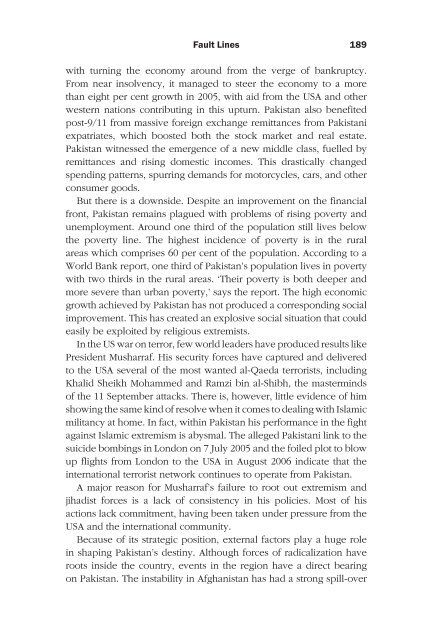Frontline Pakistan : The Struggle With Militant Islam - Arz-e-Pak
Frontline Pakistan : The Struggle With Militant Islam - Arz-e-Pak
Frontline Pakistan : The Struggle With Militant Islam - Arz-e-Pak
You also want an ePaper? Increase the reach of your titles
YUMPU automatically turns print PDFs into web optimized ePapers that Google loves.
Fault Lines<br />
with turning the economy around from the verge of bankruptcy.<br />
From near insolvency, it managed to steer the economy to a more<br />
than eight per cent growth in 2005, with aid from the USA and other<br />
western nations contributing in this upturn. <strong><strong>Pak</strong>istan</strong> also benefited<br />
post-9/11 from massive foreign exchange remittances from <strong><strong>Pak</strong>istan</strong>i<br />
expatriates, which boosted both the stock market and real estate.<br />
<strong><strong>Pak</strong>istan</strong> witnessed the emergence of a new middle class, fuelled by<br />
remittances and rising domestic incomes. This drastically changed<br />
spending patterns, spurring demands for motorcycles, cars, and other<br />
consumer goods.<br />
But there is a downside. Despite an improvement on the financial<br />
front, <strong><strong>Pak</strong>istan</strong> remains plagued with problems of rising poverty and<br />
unemployment. Around one third of the population still lives below<br />
the poverty line. <strong>The</strong> highest incidence of poverty is in the rural<br />
areas which comprises 60 per cent of the population. According to a<br />
World Bank report, one third of <strong><strong>Pak</strong>istan</strong>’s population lives in poverty<br />
with two thirds in the rural areas. ‘<strong>The</strong>ir poverty is both deeper and<br />
more severe than urban poverty,’ says the report. <strong>The</strong> high economic<br />
growth achieved by <strong><strong>Pak</strong>istan</strong> has not produced a corresponding social<br />
improvement. This has created an explosive social situation that could<br />
easily be exploited by religious extremists.<br />
In the US war on terror, few world leaders have produced results like<br />
President Musharraf. His security forces have captured and delivered<br />
to the USA several of the most wanted al-Qaeda terrorists, including<br />
Khalid Sheikh Mohammed and Ramzi bin al-Shibh, the masterminds<br />
of the 11 September attacks. <strong>The</strong>re is, however, little evidence of him<br />
showing the same kind of resolve when it comes to dealing with <strong>Islam</strong>ic<br />
militancy at home. In fact, within <strong><strong>Pak</strong>istan</strong> his performance in the fight<br />
against <strong>Islam</strong>ic extremism is abysmal. <strong>The</strong> alleged <strong><strong>Pak</strong>istan</strong>i link to the<br />
suicide bombings in London on 7 July 2005 and the foiled plot to blow<br />
up flights from London to the USA in August 2006 indicate that the<br />
international terrorist network continues to operate from <strong><strong>Pak</strong>istan</strong>.<br />
A major reason for Musharraf’s failure to root out extremism and<br />
jihadist forces is a lack of consistency in his policies. Most of his<br />
actions lack commitment, having been taken under pressure from the<br />
USA and the international community.<br />
Because of its strategic position, external factors play a huge role<br />
in shaping <strong><strong>Pak</strong>istan</strong>’s destiny. Although forces of radicalization have<br />
roots inside the country, events in the region have a direct bearing<br />
on <strong><strong>Pak</strong>istan</strong>. <strong>The</strong> instability in Afghanistan has had a strong spill-over<br />
1













